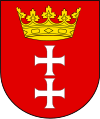| Gdańsk | |||
| |||
| Motto: Nec Temere, Nec Timide (Neither rashness nor timidity) | |||
| Coordinates: 54°22′N 18°38′E / 54.367°N 18.633°E | |||
| Country | |||
|---|---|---|---|
| Voivodeship | Pomeranian | ||
| County | city county | ||
| Established | 10th century | ||
| City rights | 1263 | ||
| Government | |||
| - Mayor | Paweł Adamowicz (PO) | ||
| Area | |||
| - City | 262 km2 (101.2 sq mi) | ||
| Population (2006) | |||
| - City | 457,630 | ||
| - Density | 1,746.7/km2 (4,523.9/sq mi) | ||
| - Metro | 1,080,700 | ||
| Time zone | CET (UTC+1) | ||
| - Summer (DST) | CEST (UTC+2) | ||
| Postal code | 80-008 to 80-958 | ||
| Area code(s) | +48 58 | ||
| Car plates | GD | ||
| Website | http://www.gdansk.pl | ||
Gdańsk (pronounced /ɡəˈdɑːnsk/, Polish [gdaɲsk] (![]() listen); German: Danzig [ˈdantsɪç] (
listen); German: Danzig [ˈdantsɪç] (![]() listen); Kashubian: Gduńsk; Latin: Gedania, Dantiscum) is the city at the centre of the fourth-largest metropolitan area in Poland.[1] It is Poland's principal seaport as well as the capital of the Pomeranian Voivodeship. It is also historically the largest city of the Kashubian region. The city is close to the former boundary between West Slavic and Germanic lands and it has a complex political history with long spells of Polish rule interspersed with periods of German control and two spells as a free city. For much of its history the majority of its inhabitants were German-speakers who referred to their city as Danzig, but after World War II it again became part of Poland.
listen); Kashubian: Gduńsk; Latin: Gedania, Dantiscum) is the city at the centre of the fourth-largest metropolitan area in Poland.[1] It is Poland's principal seaport as well as the capital of the Pomeranian Voivodeship. It is also historically the largest city of the Kashubian region. The city is close to the former boundary between West Slavic and Germanic lands and it has a complex political history with long spells of Polish rule interspersed with periods of German control and two spells as a free city. For much of its history the majority of its inhabitants were German-speakers who referred to their city as Danzig, but after World War II it again became part of Poland.
The city lies on the southern edge of Gdańsk Bay (of the Baltic Sea), in a conurbation with the spa town of Sopot, the city of Gdynia and suburban communities, which together form a metropolitan area called the Tricity (Trójmiasto), with a population of over 800,000.[1] Gdańsk itself has a population of 458,053 (2006), making it the largest city in the Pomerania region of Northern Poland.
Gdańsk is situated at the mouth of the Motława River, connected to the Leniwka, a branch in the delta of the nearby Vistula River, whose waterway system supplies 60% of the area of Poland and connects Gdańsk to the national capital in Warsaw. This gives the city a unique advantage as the center of Poland's sea trade. Together with the nearby port of Gdynia, Gdańsk is also an important industrial center. Historically an important seaport and shipbuilding center, Gdańsk was a member of the Hanseatic League.
The city was the birthplace of the Solidarity movement which, under the leadership of Gdańsk political activist Lech Wałęsa, played a major role in bringing an end to Communist rule across Central Europe. It is also the home and birthplace of Polish Prime Minister Donald Tusk, who is of Kashubian origin...
Names
The city's name is thought to originate from the Gdania river,[2] the original name of the Motława branch on which the city is situated. Gdańsk and Gdania are considered to be derivations from the Gothic name of the area (Gutiskandja),[3] however this has also been questioned.[4] Like many other Central European cities, Gdańsk has had many different names throughout its history.
The name Gdańsk is usually pronounced /ɡəˈdɑːnsk/, sometimes /ɡəˈdaɪnsk/ or /ɡəˈdænsk/, in English. The diacritic over the "n" is frequently omitted by non-Poles. In the local Kashubian language it is known as Gduńsk.
The Germanised version of this name, Danzig, has been used by the German population, as well as in English[5] until the end of World War II. Other former English versions of its name include Dantzig, Dantsic, and Dantzic. The city's Latin name may be given as either Gedania, Gedanum or Dantiscum; the variety of Latin names reflects the mixed influence of the city's Polish, German and Kashubian heritage.
The name of a settlement was recorded after St. Adalbert's demise in 997 A.D. as urbs Gyddanyzc and later was written as Kdanzk (1148), Gdanzc (1188), Danceke[6] (1228), Gdansk (1236), Danzc (1263), Danczk (1311, 1399, 1410, 1414-1438), Danczik (1399, 1410, 1414), Danczig (1414), Gdansk (1454, 1468, 1484), Gdansk (1590), Gdąnsk (1636) and in Latin documents Gedanum or Dantiscum.

On special occasions it is also known as The Royal Polish City of Gdańsk (Polish: Królewskie Polskie Miasto Gdańsk, Latin: Regia Civitas Polonica Gedanensis, Kashubian: Królewsczi Polsczi Gard Gduńsk).[7][8][9]
The Kashubians prefer the name: Our Capital City Gdańsk (Nasz Stoleczny Gard Gduńsk) or The Kashubian Capital City Gdańsk (Stoleczny Kaszëbsczi Gard Gduńsk).
More info [HERE] on Wiki's site.Now here's how they Rock!!!
Best for last as always... "Mother"












No comments:
Post a Comment